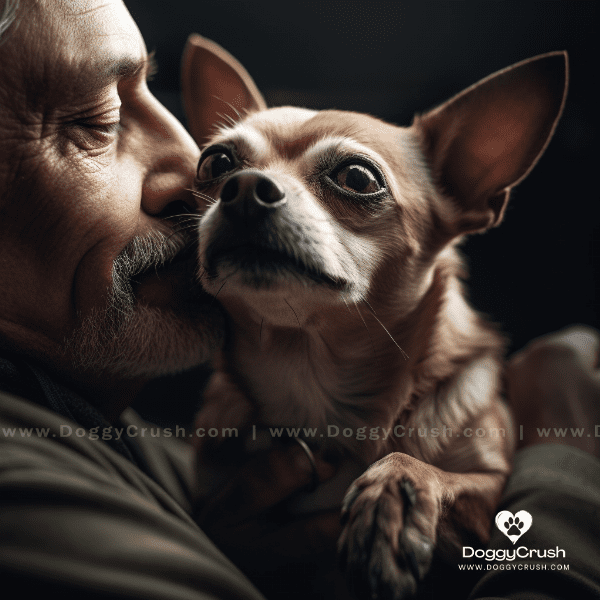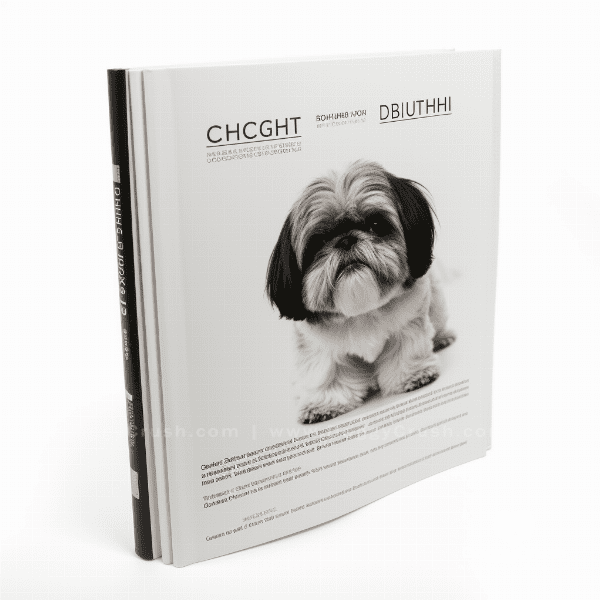Table of Contents
- The History of the Chihuahua Dog
- Characteristics and Personality Traits of Chihuahuas
- Understanding Chihuahua Body Language
- Proper Care and Grooming for Chihuahuas
- Training Tips for Your Chihuahua
- Chihuahua Health Concerns and How to Prevent Them
- Chihuahua Nutrition and Diet Needs
- Fun Activities to Enjoy with Your Chihuahua
- Chihuahua as a Family Pet: Pros and Cons
- Adopting a Chihuahua: What You Need to Know
The History of the Chihuahua Dog
Chihuahuas are believed to have originated in Mexico, particularly in the state of Chihuahua. However, the exact origin of the breed is still unknown. According to some experts, the breed may have descended from the Techichi, a dog that was kept by the Toltec people of Mexico over a thousand years ago. Others believe that the Chihuahua is a descendant of the Chinese Crested dog, which was brought to Mexico by Spanish traders.
Appearance Changes Over Time
One thing is clear: the Chihuahua has evolved over time. Early Chihuahuas were larger and more muscular than the Chihuahuas we see today. They were also more varied in color and coat type. It wasn’t until the early 1900s that the breed was standardized in terms of appearance. The Chihuahua Club of America was formed in 1923, and the American Kennel Club recognized the breed in 1904.
Popularity Through The Years
Over the years, Chihuahuas have been popular with various groups of people. They were a favorite among the royalty of ancient Mexico and were often depicted in artwork from that time. In the 19th century, Chihuahuas became popular in the United States, particularly among the wealthy. In recent years, Chihuahuas have been popularized in Hollywood movies and TV shows, leading to a surge in demand for the breed.
Myth About Chihuahua
Despite their popularity, Chihuahuas are often misunderstood. Many people believe that they are nervous and aggressive, but this is a myth. Chihuahuas can be loyal and affectionate pets when properly trained and socialized. They are also intelligent and trainable, and can excel in obedience and agility competitions.
Conclusion
In conclusion, the history of the Chihuahua dog is a fascinating one, with many theories and myths surrounding their origin. Regardless of their ancestry, Chihuahuas have become a beloved breed around the world, thanks to their unique personality, small size, and adorable appearance. Understanding their history can help us appreciate the traits that make them such wonderful pets today.
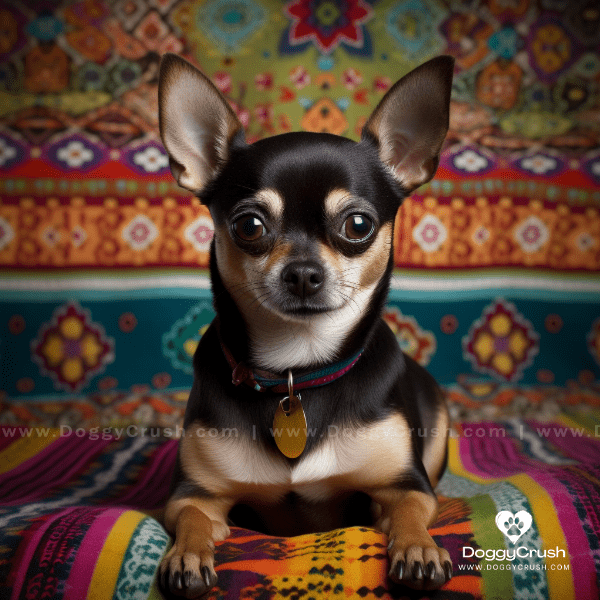
Characteristics and Personality Traits of Chihuahuas
Chihuahuas are known for their unique appearance and playful personalities. Here are some of their most notable characteristics and personality traits:
Size and Appearance
Chihuahuas are the smallest dog breed in the world, weighing only 2-6 pounds when fully grown. They have a distinctive apple-shaped head and large, round eyes that give them an almost cartoonish appearance. They come in a variety of colors, including black, tan, fawn, and white.
Personality Traits
Despite their small size, Chihuahuas have big personalities. They are often described as spunky, playful, and loyal. They love attention and affection from their owners and can be quite protective of them. Chihuahuas are also known for their stubbornness, which can make them a challenge to train. However, with patience and positive reinforcement, they can learn to follow commands and be well-behaved pets.
Temperament
Chihuahuas are not always suitable for families with small children, as they can be easily injured due to their small size. They also have a tendency to be suspicious of strangers, which can make them good watchdogs. However, this can also make them wary of new people and animals, so socialization from a young age is important.
Energy Level
Despite their small size, Chihuahuas are full of energy and require regular exercise. They love to play and can become bored and destructive if they don’t get enough stimulation. A daily walk or play session can help keep them healthy and happy.
Conclusion
In conclusion, Chihuahuas are small dogs with big personalities. They are loyal, playful, and protective, but also have a stubborn streak that can make them a challenge to train. Their unique appearance and energetic personalities make them a beloved breed among dog lovers around the world.

Understanding Chihuahua Body Language
As with any animal, understanding a Chihuahua’s body language is crucial to building a strong relationship with them. Here are some key body language cues to look out for:
Ears
A Chihuahua’s ears can tell you a lot about their mood. When their ears are erect and facing forward, they are alert and interested in their surroundings. When their ears are flattened against their head, they are feeling scared or submissive. If their ears are partially flattened, it may indicate that they are feeling defensive.
Tail
Like their ears, a Chihuahua’s tail can reveal a lot about their mood. If their tail is up and wagging, it usually means they are happy and excited. If their tail is tucked between their legs, they may be feeling scared or nervous. A straight tail can indicate alertness, while a raised tail can indicate aggression.
Eyes
A Chihuahua’s eyes can also give you insights into their mood. Dilated pupils can indicate excitement or fear, while constricted pupils may indicate aggression or stress. If a Chihuahua is avoiding eye contact, it may indicate shyness or submission.
Body Posture
A Chihuahua’s overall body posture can also reveal their mood. If they are standing tall with their weight evenly distributed, it usually means they are feeling confident and secure. If they are crouching with their weight shifted towards their hindquarters, they may be feeling defensive or scared. A relaxed, loose posture can indicate that they are feeling calm and content.
Conclusion
In conclusion, understanding a Chihuahua’s body language is essential to building a strong bond with them. By paying attention to their ears, tail, eyes, and body posture, you can get a better sense of their mood and respond appropriately. With patience and practice, you can become fluent in the language of Chihuahuas and deepen your relationship with your furry friend.
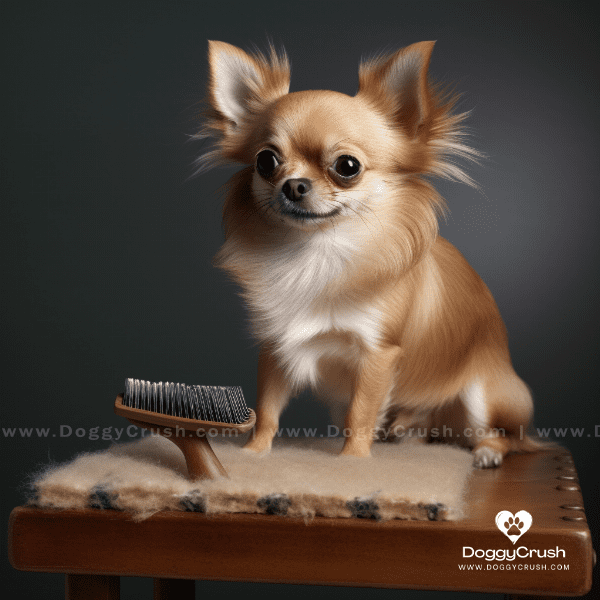
Proper Care and Grooming for Chihuahuas
Proper care and grooming are essential for the health and happiness of your Chihuahua. Here are some tips to help you keep your furry friend looking and feeling their best:
Grooming
Chihuahuas have a short coat that requires minimal grooming. However, they do shed regularly, so weekly brushing can help remove loose hair and keep their coat looking shiny. Bathing should be done as needed, using a gentle dog shampoo to avoid drying out their skin. It’s also important to regularly check their ears for signs of infection and to trim their nails to avoid overgrowth.
Dental Care
Like all dogs, Chihuahuas are susceptible to dental problems such as gum disease and tooth decay. Regular teeth brushing with a dog-specific toothpaste can help prevent these issues. You can also provide your Chihuahua with dental chews or toys to help keep their teeth clean.
Nutrition
Proper nutrition is key to keeping your Chihuahua healthy. Choose a high-quality dog food that is specifically formulated for small breeds. Avoid feeding your Chihuahua table scraps or human food, which can lead to digestive issues and obesity. It’s also important to monitor their weight and adjust their food intake as needed to maintain a healthy body condition.
Exercise
Chihuahuas may be small, but they still need regular exercise to stay healthy and happy. Daily walks or play sessions can help prevent obesity and other health problems. It’s important to provide them with plenty of mental stimulation as well, through interactive toys or training exercises.
Veterinary Care
Regular veterinary care is crucial for maintaining your Chihuahua’s health. They should receive routine check-ups, vaccinations, and preventative care such as flea and tick prevention. It’s also important to be aware of common health problems that can affect Chihuahuas, such as dental issues, patellar luxation, and heart disease.
Conclusion
In conclusion, proper care and grooming are essential for the health and happiness of your Chihuahua. By providing them with regular grooming, dental care, proper nutrition, exercise, and veterinary care, you can help ensure that they live a long and healthy life. With love and attention, your Chihuahua can be a loyal and affectionate companion for many years to come.
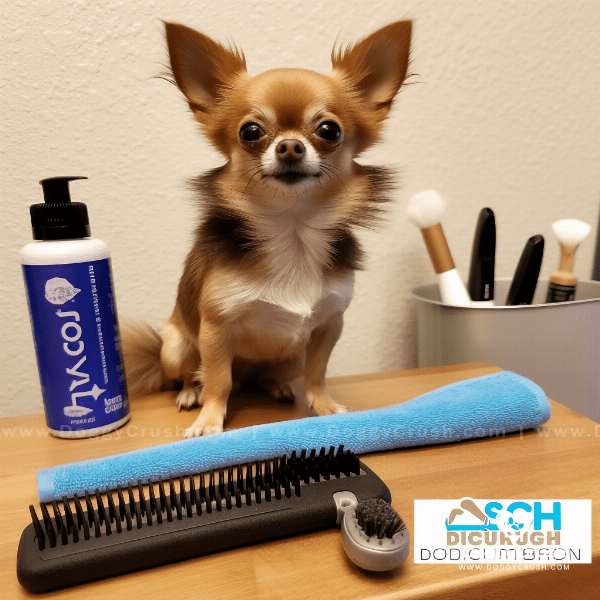
Training Tips for Your Chihuahua
Training your Chihuahua is important for both their safety and your sanity as a pet owner. Here are some tips to help you effectively train your furry friend:
Start Early
It’s important to start training your Chihuahua as early as possible. Puppies have a natural desire to please their owners, and they learn quickly at a young age. Early training can help prevent bad habits from forming and establish a foundation for more advanced training later on.
Use Positive Reinforcement
Positive reinforcement is the most effective way to train your Chihuahua. This means rewarding good behavior with treats, praise, or affection. It’s important to avoid punishment or negative reinforcement, as this can cause your Chihuahua to become fearful or aggressive.
Be Patient
Chihuahuas can be stubborn and challenging to train, so it’s important to be patient and consistent. Set clear expectations and reward good behavior consistently. Avoid becoming frustrated or angry, as this can cause your Chihuahua to become anxious or fearful.
Socialize Your Chihuahua
Socialization is important for all dogs, but it’s especially important for Chihuahuas, who can be wary of strangers and other animals. Expose your Chihuahua to a variety of people and animals from a young age, and reward good behavior around them. This can help prevent fear or aggression towards new people and animals.
Use Basic Commands
Teaching your Chihuahua basic commands such as “sit,” “stay,” and “come” can help keep them safe and well-behaved. Use positive reinforcement to reward good behavior, and be patient as your Chihuahua learns.
Conclusion
In conclusion, training your Chihuahua is important for both their safety and your sanity as a pet owner. By starting early, using positive reinforcement, being patient, socializing your Chihuahua, and using basic commands, you can help ensure that your furry friend is a well-behaved and obedient companion. With love and patience, your Chihuahua can become a source of joy and happiness for many years to come.
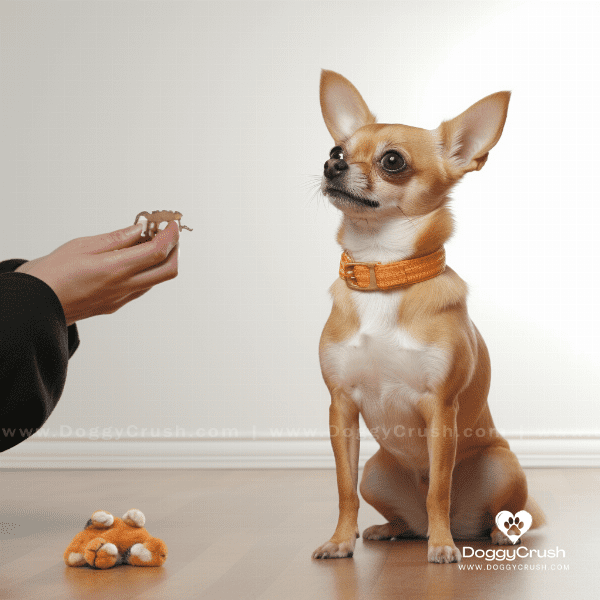
Chihuahua Health Concerns and How to Prevent Them
Chihuahuas are generally a healthy breed, but like all dogs, they are prone to certain health issues. Here are some common health concerns that affect Chihuahuas and how to prevent them:
Dental Issues
Chihuahuas are prone to dental problems such as gum disease and tooth decay. Regular dental care, including brushing their teeth and providing dental chews or toys, can help prevent these issues. A yearly dental exam by a veterinarian can also help catch any potential dental problems early on.
Patellar Luxation
Patellar luxation is a condition where the kneecap moves out of place, causing pain and discomfort. This condition is common in Chihuahuas due to their small size and can be prevented by maintaining a healthy weight and avoiding excessive jumping or other high-impact activities.
Hypoglycemia
Hypoglycemia, or low blood sugar, is a common health concern in young Chihuahuas. This can be prevented by feeding them small, frequent meals throughout the day and avoiding long periods without food. It’s also important to monitor their energy levels and seek veterinary care immediately if you notice signs of hypoglycemia, such as lethargy or shakiness.
Heart Disease
Chihuahuas are prone to heart disease, including heart murmurs and congestive heart failure. Regular veterinary check-ups, including heart exams, can help detect these issues early on. Maintaining a healthy weight, providing regular exercise, and avoiding excessive stress can also help prevent heart disease.
Obesity
Obesity is a common health concern in Chihuahuas, which can lead to other health issues such as joint problems and diabetes. Feeding them a balanced diet, providing regular exercise, and avoiding overfeeding can help prevent obesity.
Conclusion
In conclusion, while Chihuahuas are generally a healthy breed, they are prone to certain health issues. By providing regular veterinary care, maintaining a healthy weight, providing dental care, and monitoring their energy levels, you can help prevent common health concerns in Chihuahuas. With proper care and attention, your Chihuahua can live a long and healthy life by your side.
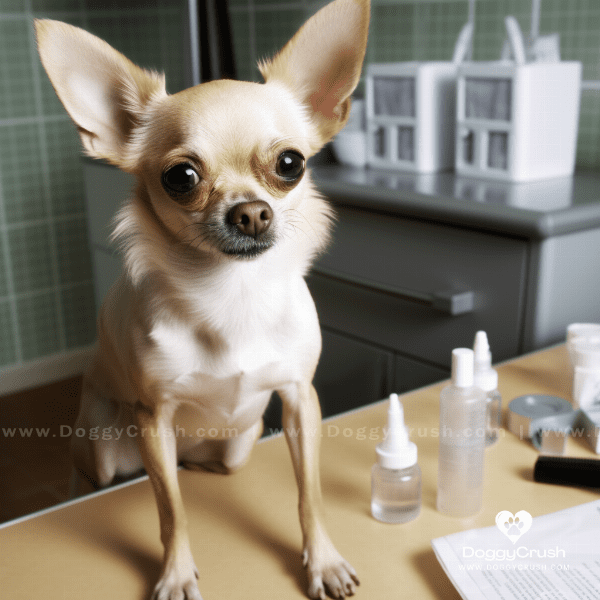
Chihuahua Nutrition and Diet Needs
Proper nutrition is important for the health and well-being of your Chihuahua. Here are some tips on how to meet their nutritional needs:
Feeding Schedule
Chihuahuas should be fed small, frequent meals throughout the day rather than one or two large meals. This helps prevent hypoglycemia, a common health concern in small breeds. A feeding schedule of three to four small meals per day is recommended.
High-Quality Dog Food
Choose a high-quality dog food that is specifically formulated for small breeds. Look for a food that contains high-quality proteins, such as chicken or fish, and avoid fillers such as corn or soy. It’s also important to avoid feeding your Chihuahua table scraps or human food, which can lead to digestive issues and obesity.
Caloric Intake
Chihuahuas have a high metabolism and require a relatively high caloric intake compared to other small breeds. On average, a Chihuahua should consume between 200-400 calories per day, depending on their age, activity level, and weight.
Treats
Treats should be given in moderation and should not make up more than 10% of your Chihuahua’s daily caloric intake. Look for low-calorie treats specifically designed for small breeds, and avoid giving them table scraps or human food.
Water Intake
It’s important to provide your Chihuahua with access to clean, fresh water at all times. Make sure to regularly clean and refill their water bowl to encourage them to drink enough water.
Conclusion
In conclusion, proper nutrition is crucial to the health and well-being of your Chihuahua. By providing them with a high-quality dog food, feeding them small, frequent meals throughout the day, monitoring their caloric intake, giving treats in moderation, and ensuring they have access to clean water, you can help keep your furry friend healthy and happy. With proper nutrition and care, your Chihuahua can live a long and healthy life by your side.
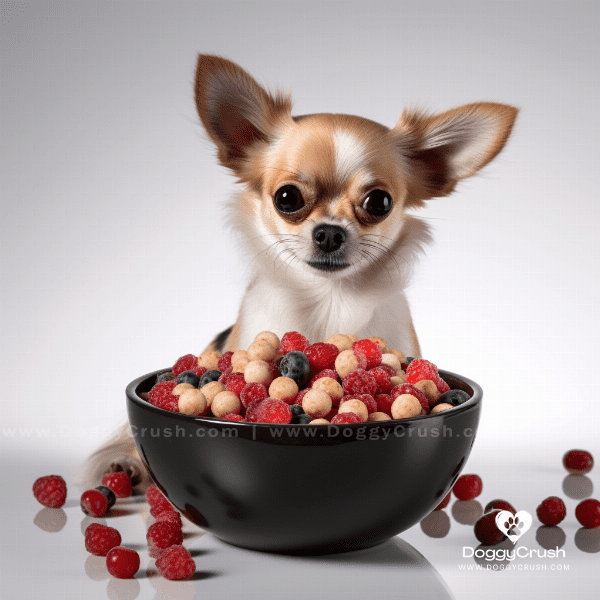
Fun Activities to Enjoy with Your Chihuahua
Spending time with your Chihuahua is not only important for their happiness, but it can also be a great bonding experience for you both. Here are some fun activities to enjoy with your furry friend:
Walks and Hikes
Chihuahuas may be small, but they still enjoy getting out and exploring their surroundings. Take your Chihuahua on walks or hikes in a safe, dog-friendly area to provide them with exercise and mental stimulation. Just be sure to keep them on a leash to prevent them from running off or getting into trouble.
Playtime
Chihuahuas love to play, and there are many toys and games you can enjoy with them. From tug-of-war to fetch, there are endless ways to engage your furry friend in playtime. You can also try puzzle toys or interactive games to provide mental stimulation and help prevent boredom.
Training
Training can be a fun and rewarding activity for both you and your Chihuahua. Teach them new tricks, work on basic obedience commands, or try agility training to provide physical and mental stimulation. Use positive reinforcement techniques to make training a positive experience for your furry friend.
Dog Parks
Dog parks can be a great place for Chihuahuas to socialize with other dogs and get some exercise. Just be sure to choose a dog park that is small-dog-friendly and supervise your Chihuahua at all times to ensure their safety.
Cuddling
Chihuahuas love nothing more than snuggling up with their favorite humans. Take some time to relax and cuddle with your furry friend, whether it’s watching TV or taking a nap together. This can help strengthen your bond and provide a sense of comfort for both you and your Chihuahua.
Conclusion
In conclusion, spending time with your Chihuahua can be a fun and rewarding experience for both of you. From walks and hikes to playtime and training, there are many ways to engage your furry friend in activities that promote their physical and mental well-being. With love and attention, your Chihuahua can become a cherished companion and a source of joy in your life.

Chihuahua as a Family Pet: Pros and Cons
Chihuahuas can make wonderful family pets, but like any breed, they come with their own set of pros and cons. Here are some things to consider before bringing a Chihuahua into your home:
Pros
- Size: Chihuahuas are small and portable, making them great for apartment living or for families with limited space.
- Affectionate: Chihuahuas are known for their loyalty and affection towards their owners. They thrive on human companionship and love to cuddle and snuggle.
- Low Maintenance: Chihuahuas have a short coat that requires minimal grooming, and they are generally a low-maintenance breed.
- Good Watchdogs: Despite their small size, Chihuahuas make excellent watchdogs and will alert their owners to any potential danger or strangers.
Cons
- Fragile: Chihuahuas are small and fragile, and can easily be injured if mishandled or accidentally stepped on. They are not recommended for families with young children or large, active dogs.
- High-Pitched Barking: Chihuahuas are known for their high-pitched barking, which can be excessive and annoying to some people. Proper training can help minimize this behavior.
- Health Concerns: Chihuahuas are prone to certain health issues such as dental problems, patellar luxation, and heart disease. Regular veterinary care and preventative measures can help minimize these concerns.
- Sensitive: Chihuahuas can be sensitive to changes in their environment or routine, and may become anxious or fearful in new situations. Proper socialization and training can help prevent this behavior.
Conclusion
In conclusion, Chihuahuas can make wonderful family pets for the right family. Their small size, affectionate nature, and low-maintenance grooming needs make them appealing to many pet owners. However, their fragility, high-pitched barking, and potential health concerns should also be taken into consideration before bringing a Chihuahua into your home. With proper care, training, and attention, your Chihuahua can be a loving and loyal companion for many years to come.
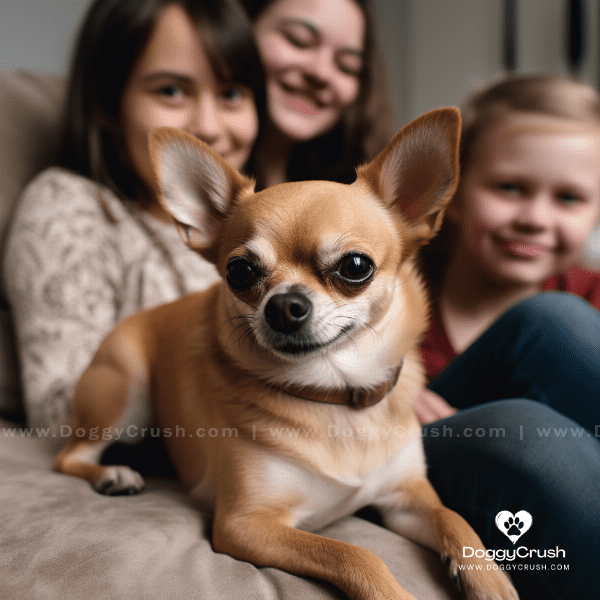
Adopting a Chihuahua: What You Need to Know
Adopting a Chihuahua can be a rewarding experience, but it’s important to know what you’re getting into before bringing a furry friend into your home. Here are some things to consider when adopting a Chihuahua:
Finding a Reputable Shelter or Rescue
When looking to adopt a Chihuahua, it’s important to find a reputable shelter or rescue. Look for a shelter or rescue that screens their dogs for health and behavioral issues, and provides proper care and socialization while they await adoption.
Preparing Your Home
Before bringing a Chihuahua home, it’s important to prepare your home and make it safe for your new furry friend. This includes providing a safe space for them to rest, securing any potential hazards or dangers, and purchasing necessary supplies such as food, water bowls, and toys.
Medical Needs
Chihuahuas, like all dogs, require regular veterinary care to maintain their health and well-being. This includes routine check-ups, vaccinations, and preventative care such as dental cleanings and flea and tick prevention.
Behavioral Training
Proper training and socialization are important for Chihuahuas to ensure they become well-behaved and obedient companions. This includes basic obedience training, socializing with other dogs and people, and addressing any potential behavioral issues early on.
Time Commitment
Chihuahuas require time and attention from their owners, including daily exercise, playtime, and mental stimulation. It’s important to be prepared to commit time and effort to your furry friend to ensure they thrive in their new home.
Conclusion
In conclusion, adopting a Chihuahua can be a wonderful experience, but it’s important to be prepared and knowledgeable before bringing a furry friend into your home. By finding a reputable shelter or rescue, preparing your home, addressing medical needs, providing proper training and socialization, and committing time and attention to your furry friend, you can help ensure a successful and happy adoption. With love and patience, your Chihuahua can become a beloved companion and a source of joy in your life.
